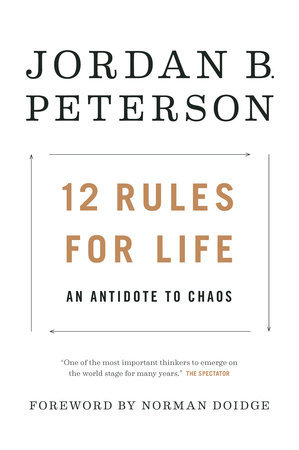
1 Line Summary
12 Rules for Life is a book that offers practical advice on how to live a meaningful and fulfilling life.
What Will You Learn
Here are some of the benefits of reading “12 Rules for Life”, you’ll learn how to:
- take responsibility for your own life,
- set and achieve your goals,
- build strong relationships,
- live a meaningful and fulfilling life.
Best Quotations from the Book
- Set your house in perfect order before you criticize the world.
- Tell the truth – or, at least, don’t lie.
- Compare yourself to who you were yesterday, not to who someone else is today.
- Assume that the person you are listening to might know something you don’t.
- Pursue what is meaningful (not what is expedient).
- Do not let your children do anything that makes you dislike them.
- Treat yourself like someone you are responsible for helping.
- The past is not necessarily what it was, even though it has already occurred.
- To stand up straight with your shoulders back is to accept the terrible responsibility of life, with eyes wide open.
Book Summary
“12 Rules for Life: An Antidote to Chaos” by Jordan Peterson offers a profound and comprehensive guide to navigating life’s complexities. Here are the twelve key rules from the book:
Rule 1: Stand Up Straight with Your Shoulders Back
- In the first rule, Peterson underscores the importance of adopting an upright posture both physically and symbolically.
- By standing tall and confident, we signal ourselves and others that we are ready to face life’s challenges.
- This rule emphasizes the significance of taking responsibility for one’s life and not succumbing to the victim mentality.
- The posture we choose reflects our attitude towards the world, and by confronting chaos with strength, we gain a sense of purpose and self-respect.
Rule 2: Treat Yourself Like Someone You Are Responsible for Helping
- This rule elaborates the concept of self-care and the tendency many people have to prioritize the well-being of others while neglecting themselves.
- By recognizing our own value and taking responsibility for our health and happiness, we can contribute positively to the world around us.
Rule 3: Make Friends with People Who Want the Best for You
- Third rule explores the significance of our social environment and the company we keep. Peterson advises that surrounding ourselves with people who support our growth and well-being is essential for leading a fulfilling life.
- He highlights the idea that negative, toxic relationships can undermine our happiness and should be managed or avoided, while positive, mutually supportive relationships can be a source of strength and encouragement.
Rule 4: Compare Yourself to Who You Were Yesterday, Not to Who Someone Else Is Today
- Comparing ourselves to others can lead to the feelings of inadequacy and despair. Instead, focus on personal growth and use the past self as the yardstick for improvement.
- This perspective allows for a more positive and productive evaluation of one’s progress.
Rule 5: Do Not Let Your Children Do Anything That Makes You Dislike Them
- Allowing children to behave without structure and discipline can lead to negative consequences, both , for them and their parents.
- Setting appropriate boundaries and instilling respect and responsibility in children is essential for their healthy development.
Rule 6: Set Your House in Perfect Order Before You Criticize the World
- Sixth rule addresses the idea of personal responsibility and the tendency to blame external factors for life’s challenges; however, true change begins with self-improvement.
- By addressing our internal chaos and working to resolve personal issues, we become better equipped to contribute positively to the world.
- The rule underscores the value of personal accountability in making a meaningful difference.
Rule 7: Pursue What Is Meaningful (Not What Is Expedient)
- The pursuit of short-term, expedient pleasures often leads to a shallow and unfulfilled existence. Instead, seek out what is truly meaningful and significant, even if it involves sacrifices and discomfort.
- The pursuit of meaning, he suggests, provides a deeper and more enduring sense of fulfillment.
Rule 8: Tell the Truth – or, at Least, Don’t Lie
- This rule emphasizes the importance of honesty, both in one’s interactions with others and in one’s relationship with oneself.
- Peterson argues that lying or being deceitful erodes trust and integrity.
- Speaking the truth, even when it is difficult, builds character and trustworthiness, contributing to personal growth and healthier relationships.
Rule 9: Assume That the Person You Are Listening to Might Know Something You Don’t
- Peterson highlights the importance of active listening and humility, assuming others have something valuable to share allows for a more open and productive exchange of ideas.
- It fosters personal growth and the opportunity to learn from others.
Rule 10: Be Precise in Your Speech
- Tenth rule emphasizes that speaking accurately and thoughtfully not only enhances our ability to convey ideas but also sharpens our thinking.
- It is a tool for minimizing misunderstandings and conflicts and for fostering productive dialogues.
Rule 11: Do Not Overprotect Your Children
- In this rule, Peterson suggests that sheltering children from all sorts of risk and adversity can deprive them of the opportunity to learn valuable life skills and resilience.
- Allowing children to face and overcome challenges prepares them for the complexities of adulthood.
Rule 12: Pet a Cat When You Encounter One on the Street
- The final rule serves as a metaphor of recognizing and appreciating the small, joyful moments in life. It encourages finding consolation and contentment in simple pleasures, even amid life’s struggles and challenges.
- Embracing these moments contributes to overall well-being and resilience.
If you are serious in improving your life, I highly recommend reading “12 Rules for Life” by Jordan B Peterson.
To know the insights of Habits, read “Atomic Habits“, and Click to Understand “The Insights of Self Awareness“


Pingback: “The Power of Now” by Eckhart Tolle -
Pingback: "13 Things Mentally Strong People Don’t Do" : Book Summary
Pingback: “Character Strengths Interventions”: Book Summary -
Pingback: “13 Things Mentally Strong People Don’t Do”: Book Summary
Pingback: “The Compound Effect” by Darren Hardy: Book Summary
Pingback: “The Power of Now” by Eckhart Tolle: Book Summary
Pingback: “Character Strengths Interventions”: Book Summary
Pingback: “Energize Your Workplace” by Jane E. Dutton: Book Summary -
Pingback: “The 7 Habits of Highly Effective People”: Book Summary -
Pingback: “Breaking The Habit Of Being Yourself”: Book Summary »